|
|
 |
|
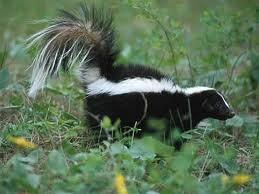
Skunks
& Their Odors
Skunks are unusual, funny,
amazing, friendly animals that just have a bad reputation. Most complaints about skunks are attributable to rumor
and falsehood, and a pungent defensive weapon. Skunks learn quickly and remember well, especially when it comes to food, this
often leads to "repeat offenses" and more bad press.
How to discourage skunks
from living under you house or deck. I have received many enquiries on how to get rid of skunks that are living under a deck
or house. By screening in your deck and/or closing any openings around your residence, when the skunk returns just
before dawn finding no access, he will look for a NEW HOME.
As for the Odor he may
have left behind, we provide latest commerical method for odor removal in a residence
|
 |
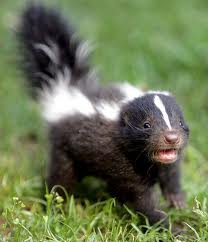 Skunks were once thought
to be part of the same animal family as weasels, ferrets, and badgers. Now, thanks to DNA testing,
they are recognized as more distantly related to other animals and were identified as a separate family. The common striped
skunk is the most well known in the United States, due to it's extensive habitat range, it's size (up to 12 pounds), and it's
distinctive striped markings. Domestic skunks are commonly bred from direct lines of the striped skunk, however some cross
breeding between the striped and hooded skunks is accepted as cause for the varied colors and pattern markings on domestic
skunks. Wild skunks warn predators and competitors by stomping their front feet and raising their tails in full
bloom. Skunks will run directly toward a threat and stop (sometimes within inches), then stomp and hiss or squeal. If the
enemy doesn't heed the warnings the skunk will turn and spray. Skunks make sounds like a squealing pig, they also grunt, whine,
screech, and will even chirp like a bird..
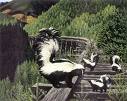
The main predators of the
skunk are owls and other large birds of prey. Most birds cannot smell much if at all and are not bothered by the skunk spray
odor, and the birds strike fast from above, so a skunk has little defense in their attacks. Skunks are often blamed for
causing problems in neighborhoods, digging holes, spraying dogs, etc. Humans continSkunks can not jump up or knock over your
garbage can ue to trap and kill skunks as nuisance wildlife.
|
 |
|
|
|
 |
|
Skunks use their strong-smelling
spray to defend themselves—in fact they don't have any other form of defense. The spray is composed of sulfuric acid
that can be "fired" from either of two independently operating anal glands. Skunks stamp their front feet as a warning when
threatened, giving you a chance to back off. Dogs, however, tend to ignore this warning. That's why it's hard to find a human
who has been sprayed, but easy to find a dog who has. Skunk odor on wayward pets may be neutralized with liberal amounts of
vinegar or tomato juice. This will make the odor tolerable—only time will eliminate it. A reported deodorant recipe
for skunk spray that can be used on animals and clothes includes these ingredients:
1 quart 3% hydrogen peroxide
1/4
cup baking soda
1 teaspoon DawnŽ liquid dish soap
Apply liberally and hold
your nose!
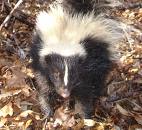 Wild skunks come out in the
evening and early morning hours usually resting at night and sleeping during the day. In the winter and early spring skunks
may be seen out of their dens at almost any time of day, especially before and after long periods of snow cover or prolonged
cold weather. Skunks do not hibernate in winter; they do sleep more but will come out of the den to forage for food when they
are not snowed in.
Skunks usually take over
groundhog, rabbit, or fox dens; the typical den is along a stream or ravine. Skunks will even allow groundhogs and rabbits
to remain in the same den (except when the females have young kits). Skunks are tolerant of other skunks, especially their
family members, often a male will den with a harem of females in the winter
breeding months. Wild skunks only live a few years (maximum of about 5) due to disease, predatory birds, and the intentional
and unintentional acts of man. Domestic skunks can live 15 years but 10 years is considered the maximum, the average lifespan
is about 7 years.
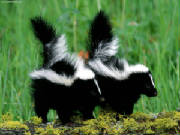
|
 |
|
|
|
|
|
|
|
 |

